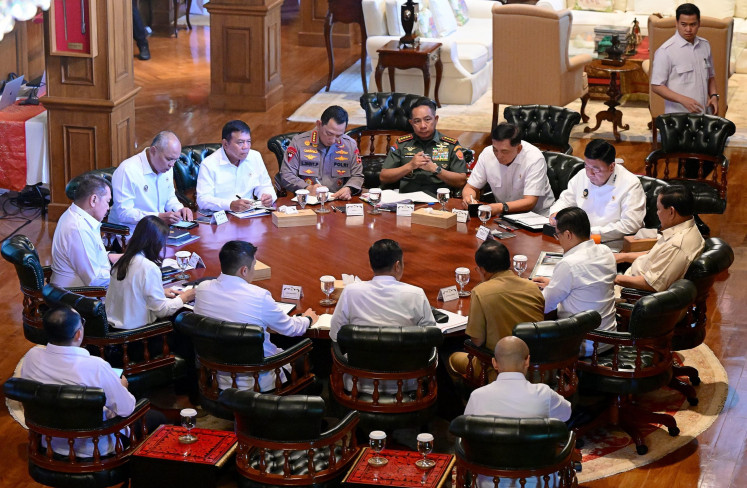Popular Reads
Top Results
Can't find what you're looking for?
View all search resultsPopular Reads
Top Results
Can't find what you're looking for?
View all search resultsStrong dollar hurts rupiah
The broad strengthening of the US dollar will not end in the short-term, with analysts predicting that the Indonesian central bank will continue to be more aggressive in its reserves accumulation strategy to build a stronger line of defenses ahead of an even stronger demand for greenbacks
Change text size
Gift Premium Articles
to Anyone
T
he broad strengthening of the US dollar will not end in the short-term, with analysts predicting that the Indonesian central bank will continue to be more aggressive in its reserves accumulation strategy to build a stronger line of defenses ahead of an even stronger demand for greenbacks.
The dollar-strengthening trend historically persisted 'for as long as 6 years', with the rupiah particularly susceptible to the surging demand for greenbacks internationally, warned Callum Henderson, the head of foreign exchange (forex) research with Standard Chartered.
'Given that this [strengthening trend of the dollar] started in 2011, then this one will last to 2017 or 2018,' he said recently in an international seminar in Jakarta. 'Ahead of the hike in US interest rates, we are going to see currency weakness and Indonesia is not going to be immune from that ['¦] Emerging markets as a whole are going to face a bumpy ride.'
Most Asian currencies fell against the dollar last week, as the ongoing economic recovery in the US boosted the global demand for greenbacks. The Bloomberg Dollar Spot Index, which tracks the US currency against 10 trading partners, rose to its strongest level in five years. The rupiah closed at 12,196 per dollar on Friday, falling 74 basis points compared to a week earlier, according to the Jakarta Interbank Spot Dollar Rate (JISDOR).
The rupiah still has room to weaken to 12,200 per dollar by the end of this year, before weakening further to 12,600 in 2015 as the currency will be exposed by the global strengthening of US dollar, predicted Ju Wang, a senior forex strategist with HSBC Bank in Hong Kong. But she argued that the rupiah should fare better against the threat of capital outflows.
'The real interest rate ' the current policy rate minus inflation ' is so high here that no one wants to sell Indonesian assets,' Wang said in an interview in Jakarta recently. 'If foreigners are still coming to Indonesia, BI will buy dollars to build their reserves, so they will not let the rupiah appreciate too much.'
BI is seen as tolerating a certain degree of rupiah weakness to build up its forex reserves, which rose to US$112 billion by the end of October, compared to $99.4 billion earlier this year.
However, BI still has limited dollar disposal compared to its central bank counter parts in the region. Indonesia's forex reserves are only sufficient to cover 6.6 months of imports, compared to 8.8 months in Malaysia and 10.8 months in the Philippines, according to data compiled by Bloomberg.










